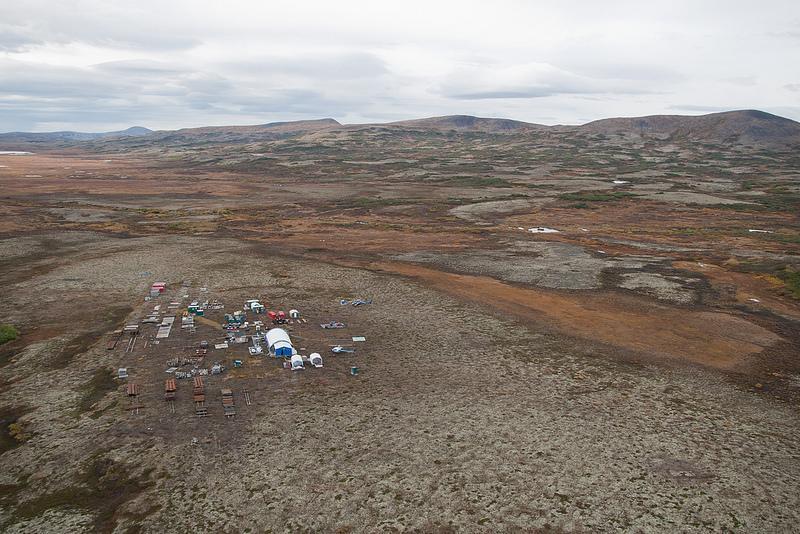
After months of delay, the Pebble Limited Partnership was granted its land use permit by the state’s Department of Natural Resources Tuesday. But taking into account the concerns raised through a public comment period, DNR is adding more oversight to Pebble’s activities and adding some new stipulations to the permit.
Alaska’s Department of Natural Resources grants the miscellaneous land use permit needed by companies like Pebble to operate on state lands. This one was different than the rest of the thousands processed annually.
“It’s a very unique process,” DNR commissioner Andy Mack said Tuesday. “A lot of what of we have done is new, including the requirement that a permit application like the one that we saw from Pebble would be subject to a public comment period.”
That followed a lawsuit challenge brought by Nunamta Aulukestai, which made its way to the Alaska Supreme Court. The result was an opportunity for the public to weigh in on Pebble’s state land use permit requests. Last fall DNR took in more than 2000 comments on this application, and Mack said staff took them very seriously.
“Many of them were substantive, many of them were Alaskan, and many of them were from the Bristol Bay region,” Mack said.
Many also alleged Pebble has left a mess at some past exploratory drill sites and that state regulators have not been stringent enough. DNR does not necessarily agree with that assessment.
“One of the central points that was raised as a matter of concern was the status of approximately 80 sites that were reviewed by [Center of Science in Public Participation],” DNR wrote in it’s report. “Upon review of the CSP2 report, in consultation with the Alaska Department of Environmental Conservation, the Department was unable to conclude there is clear evidence of permit violation, but agreed these concerns should be reviewed on site.”
The state agreed to public requests for more site inspections, and added a $2 million bonding requirement for cleanup in the event Pebble folds. The length of the requested permit was also shortened to one year.
“Miscellaneous Land Use Permits, or MLUPs, can be issued for as little as one year or for as long as five years,” Mack said. “Based on the amount of interest, and based on the need in our minds to be more proactive and get into the field and be looking at some of the concerns being raised, we issued this permit for one year.”
Groups opposed to Pebble say they did not get everything they were hoping for, including a request that the company be required to close any old boreholes no longer in use. But they did cheer the administration for the other changes the state put in place.
“This is really the state holding Pebble to a tighter standard, which they should,” Nunamta Aulukestai executive director Kim Williams said.
Williams, the United Tribes of Bristol Bay, and others have voiced concern about a perceived prior lack of state oversight and “rubber stamping” of permits for the controversial project.
“Our state hasn’t, I believe, held them to a standard of watching them, inspecting them, and making sure that they go back in and close things up,” Williams said. “So it’s good for us.”
For three summers Pebble has done little but “care and maintenance” of their mining claims. Of the more than 1,300 old boreholes, 80 were identified as problematic by the independent inspection paid for by the United Tribes of Bristol Bay. Pebble also disagrees with the findings of that report, which were a primary theme of the public comments.
“Many of the issues that were raised in the public comment window we take great exception to primarily because the technical foundation for it was not very strong,” Pebble spokesman Mike Heatwole said Tuesday. “We firmly believe that we’re in compliance with the terms and conditions for the permit to operate out there. Our work is sound, we take our responsibility very seriously and will continue to do so.”
Heatwole said the company has already put up the $2 million performance guaranty now required by DNR and would welcome the added state inspections.
“We’re looking forward to getting our summer work program on track, and we’re committed to continuing to run a compliant operation,” Heatwole said. “More than anything it’s good to have a permit in hand and ready to move forward.”
The permit issued Tuesday by the state does not authorize any new exploration at the Pebble claims, nor has the company yet requested that. However, in a press release issued Tuesday, CEO Tom Collier confirmed, “Pebble will be advancing a program of work in Alaska in 2017 to prepare the project to initiate permitting under the Clean Water Act and National Environmental Policy Act.”




